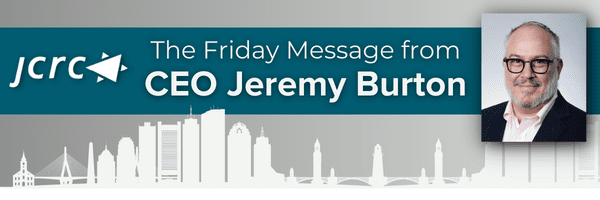
A few years back, a member of the JCRC team told me about a conversation he had while advocating on Beacon Hill. In a conversation with a senior member, he expressed that a particular issue was one that the organized Jewish community was keenly interested and invested in. The legislator’s chief of staff responded, to paraphrase: “Are you sure? Because Jeremy hasn’t been talking about this on Twitter.”
That exchange has been on my mind in recent weeks, as there has been a growing public discussion about ‘leaving Twitter’ and the actions of this platform’s new owner.
I was an early-ish fan of Twitter and the entire social media ecosystem. I had hopes that this space could be an open town hall where I could be exposed to, engage with, and learn from all kinds of people around the world. A lot of that hope was realized, and over the thirteen years since I joined Twitter, I’ve learned a lot from the people I discovered there, and I’ve had fun along the way engaging in all sorts of conversations. It has been a space that has also encouraged me to think expansively about who we are accountable to in our public voice – knowing that anything we say will be seen by a wide and diverse audience.
However, the growth of Twitter in particular, as well as many other social media platforms, has had some very troubling consequences for our discourse and for our democracy. The normalization of hate speech, the ability to engage in anonymous harassment, to spread disinformation, and the rewarding of the most polarizing voices – have all had a detrimental impact on our society.
People have had very strong and divergent opinions about the recent takeover by Elon Musk. Many are horrified by the unlocking of banned accounts that have, in the past, spread untruths and bigotry. Others have noted that ‘old’ Twitter never deplatformed several dangerous antisemites; notably the Ayatollah Khamenei, who regularly tweets Holocaust denial and threats to eliminate the Jewish state, or Minister Farakhan, who uses the platform to spread antisemitic tropes without consequences. There are other examples, of course – but this is just to observe that pre-Elon Twitter wasn’t exactly all raindrops and gummy bears.
Still, something has changed. A space that aspires to be a town square for all discourse now has one sole arbiter of what is allowed in that square. It’s a problem. And when that arbiter himself starts spreading disinformation and – this week – actual neo-Nazi antisemitic memes and images, it raises what can only be described as legitimate concerns.
So, to stay or to go?
Truth be told, if I was a private citizen looking for good quality information and perspectives from beyond my own bubble – I’d personally be elsewhere at this point. Too much of where Twitter now seems to be headed sows distrust in the quality of information and user experience. Trust is an essential part of the fabric of a healthy civic culture – trust in institutions, in leaders, in certified election outcomes. Trust is precious to our function as a society and to our ability to find a way forward, and we need to be cultivating it at every turn, not undermining it in 240 characters or less.
This is a concern I’ve written about before. And to quote Yuval Levin, “What stands out about our era in particular is a distinct kind of institutional dereliction — a failure even to attempt to form trustworthy people, and a tendency to think of institutions not as molds of character and behavior but as platforms for performance and prominence.”
Old Twitter wasn’t always great. But new Twitter foreshadows a more problematic future.
Still, I go back to that Beacon Hill story. And to JCRC’s core purpose, which is to represent our community’s values and interests in Boston’s civic square. To an extent, it is our responsibility to go where that square exists, with all its toxicity, to make sure that the political actors in Massachusetts, the faith leaders, and the local media, see and understand how we as a community are thinking about the issues of our time and the challenges of our society.
There may come a time – very soon – when those civic actors in Massachusetts decide to leave this particular town square and find other venues to discuss and debate in the public arena. It’s very possible that the user experience of other platforms will be very different from Twitter, including a limit on the kinds of crosspollination of audiences and voices that we’ve experienced here – and that will be a loss. But for now, people seem to be staying, and, therefore, so am I.
But I won’t tell you that you should be, too. I can see the unhealthy impact of platforms like Twitter on our society and our democracy. And I’d certainly invite, as always, your reflections and feedback on this moment and how we ought to show up in public space to best continue to represent the interest and values of our network.
I look forward to hearing from you.
Shabbat shalom.


